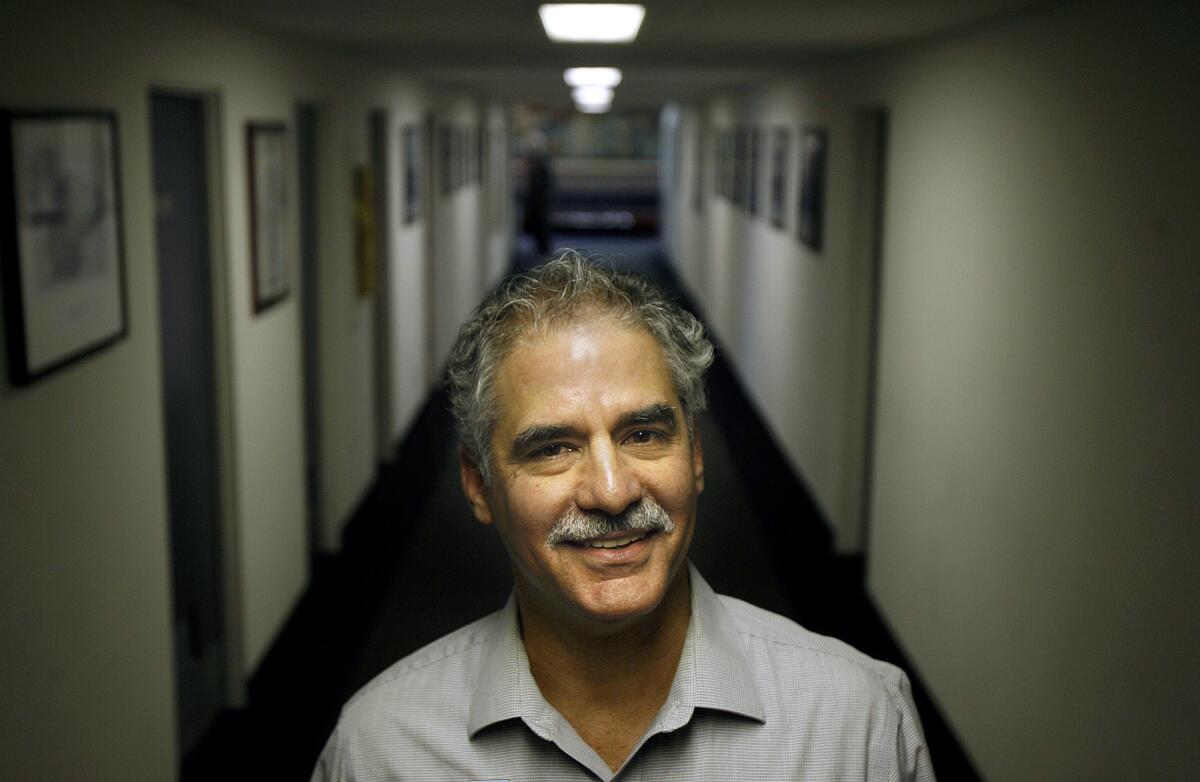Unions critical of poll on teachers tenure and seniority-based layoffs

Union leader Joshua Pechthalt said a misunderstanding of teacher job protections has turned some members of the public against these rules, including people surveyed in a just-released poll.
- Share via
Teachers unions expressed concern Monday over the results of a poll indicating that California voters are critical of current job protections provided to instructors in public schools.
The wording of poll questions and limited public awareness on these issues skewed the results, they said.
“We believe that when people have a chance to hear these issues presented more fully they are far more likely to see the value in current due-process protections and layoff procedures,” said Frank Wells, a spokesman for the California Teachers Assn.
State law provides for teachers to earn the safeguards of tenure after two years. Nearly half of voters, however, favored a period longer than three years; more than a third went further, opposing any form of tenure, according to a USC Dornsife/Los Angeles Times poll released Saturday.
The poll described tenure as meaning that “after a certain period of time, [teachers] receive strong job security and cannot be fired for poor performance without going through a lengthy process.”
Wells said that the “overwhelming majority” of teachers facing dismissal choose to “resign, retire, etc.,” without exercising their full appeal rights. And that these rights “are not a hindrance to keeping quality teachers on staff or removing underperforming ones in well-run school districts.”
Seniority is another job protection that comes into play when budget problems lead to layoffs. State law specifies that seniority, based on “last-in, first out,” should be the primary factor affecting who is the first to get laid off.
But only 8% of voters, when given a list of options, selected seniority as the best approach. In contrast, 53% preferred to lay off “a teacher who received poor marks in classroom observations”; 26% chose “a teacher whose students did not make progress on standardized tests throughout the year.”
“The poll question on layoffs was given without any context,” Wells said. “It was just a menu of factors.”
He said that so-called merit-based layoffs were ill-advised because they could be used to target teachers unfairly or to shortchange their rights under employment contracts. A more nuanced survey could have yielded different results, Wells said. For example, if the question had been: “Should teacher layoffs be used to circumvent due process and current dismissal procedures?”
The survey results echo key portions of a ruling by an L.A. County Superior Court judge who last year stripped teachers of many job projections in the landmark case of Vergara vs. California. That ruling has not been enforced, pending the fate of an appeal.
The litigation was financed by StudentsMatter, an organization founded by Silicon Valley entrepreneur Dave Welsh.
Union leaders and other critics regard the Vergara litigation as part of larger efforts to weaken unions, target employee rights and pursue misguided education reforms.
“This poll happens in a certain context, which is that over the last number of years, there’s been a well-funded, concerted effort to attack teachers’ seniority, to misrepresent it—and to scapegoat teachers for problems in the classroom,” said Joshua Pechthalt, president of the California Federation of Teachers.
“Much of the public doesn’t understand teacher tenure,” he added. “We’re in a period where the other side of the story hasn’t been adequately told—from our part frankly. And it also hasn’t gained a lot of traction in the media.”
Backers of the Vergara litigation countered that voters are not poorly informed and that the unions are out of step, including with the views of many of their members.
The poll of 1,504 registered voters was conducted from March 28 through April 7.
Twitter: @howardblume
More to Read
Sign up for Essential California
The most important California stories and recommendations in your inbox every morning.
You may occasionally receive promotional content from the Los Angeles Times.











